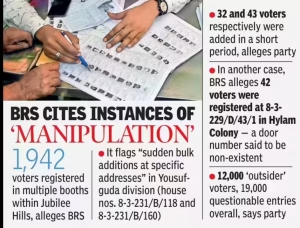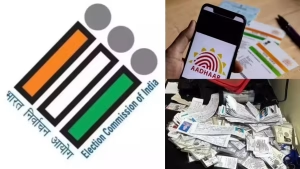Maharashtra’s political landscape witnessed a seismic controversy when Maharashtra Navnirman Sena (MNS) chief Raj Thackeray made startling allegations against the Election Commission of India on October 19, 2025. Speaking at a rally in Mumbai’s Goregaon before booth-level workers, Thackeray claimed that approximately 96 lakh (9.6 million) Maharashtra bogus voters had been systematically added to the state’s electoral rolls ahead of upcoming local body elections. This explosive accusation has sparked intense debate about electoral integrity and democratic processes in India’s second-most populous state.
 Also Read: Maharashtra Bogus Voters: Explosive Allegations Shake Democratic Integrity
Also Read: Maharashtra Bogus Voters: Explosive Allegations Shake Democratic Integrity
Other: ORS Regulation in India
The MNS president characterised manipulated elections as the gravest affront to voters, demanding immediate action from the Election Commission. His allegations specifically targeted the addition of fake entries allegedly designed to influence local body elections scheduled to be completed by January 31, 2026. Thackeray contended that similar tactics were purportedly employed before the 2024 Assembly polls, suggesting a pattern of systematic manipulation.
City-wise Breakdown of Alleged Irregularities
According to Thackeray’s detailed allegations, the Maharashtra bogus voters problem extends across major urban centres throughout the state. He claimed that between 8 and 10 lakh fake voters had been incorporated into Mumbai’s electoral rolls alone. Similar numbers ranging from 8 to 8.5 lakh were allegedly added in Thane, Pune, and Nashik, Maharashtra’s major metropolitan areas.
The MNS chief emphasised that these irregularities weren’t confined to cities but extended to villages and towns across Maharashtra. He asserted that electoral calculations were fundamentally skewed, questioning how certain parties achieved victories in the recent Assembly elections, where 232 MLAs from the MahaYuti alliance were elected, leaving both voters and victors themselves appearing astonished, according to his assessment.
Opposition Unity and Collective Action
The Maharashtra bogus voters controversy united opposition parties in an unprecedented show of solidarity. A joint delegation comprising Shiv Sena (UBT) chief Uddhav Thackeray, MNS president Raj Thackeray, NCP (Sharad Pawar) chief Sharad Pawar, Congress leaders Balasaheb Thorat and Vijay Wadettiwar, and other opposition representatives met with the State Election Commissioner and Chief Electoral Officer on October 14 and 15, 2025.
The opposition coalition presented what they claimed was concrete evidence of multiple irregularities in voter lists. These included incomplete voter addresses, incorrect house numbers, names of individuals not residing in constituencies, and instances where hundreds of voters were listed under single addresses. They also highlighted cases of duplicate registrations across different addresses and assembly segments, further substantiating concerns about Maharashtra’s bogus voters.
Congress spokesperson Sachin Sawant added another dimension to the controversy, citing Election Commission data that showed 41 lakh voters were added between the 2024 Lok Sabha and Assembly elections. More alarmingly, he questioned how 6.55 lakh voters were added within just four days between October 16 and October 19, describing this spike as unprecedented and demanding an explanation.
 Opposition Demands and Electoral Reforms
Opposition Demands and Electoral Reforms
The unified opposition presented a comprehensive memorandum demanding immediate rectification of alleged anomalies before local body elections proceed. Their primary demand centred on delaying forthcoming local body elections until the voter list receives approval from all political parties involved. Raj Thackeray specifically challenged the Election Commission, asking how it would conduct polls without first cleaning the electoral rolls.
Opposition leaders advocated for a Special Intensive Revision (SIR) exercise similar to the de-duplication drive conducted in Bihar before its assembly elections. They argued that such an exercise successfully removed duplicate names and restored confidence in the electoral process. The Maharashtra bogus voters issue, according to opposition parties, requires similar systematic intervention.
Additionally, the opposition demanded the restoration of the Voter Verifiable Paper Audit Trail (VVPAT) system for local body polls. They argued that the absence of VVPATs undermines public faith in electoral transparency. For the Brihanmumbai Municipal Corporation elections, they demanded voting through ballot papers if VVPATs aren’t permitted, emphasising the need for verifiable voting mechanisms.
The delegation also criticised the multi-member ward system used in Maharashtra, calling it confusing and unfair to voters. They urged the Election Commission to reform this model to make the electoral process more transparent and voter-friendly.
Election Commission’s Response
Maharashtra State Chief Electoral Officer S. Chocklingam issued an eight-page rebuttal on October 18, 2025, firmly denying opposition allegations regarding the Maharashtra bogus voters controversy. The CEO stated that the process of correcting and rectifying errors in voter lists is ongoing through an extremely secure portal maintained by the Election Commission of India.
Chocklingam emphasised that apart from Electoral Registration Officers, no one else can make changes to voter lists. He categorically denied opposition claims that someone outside the Election Commission handles modifications, calling such information “completely baseless and factless.” The CEO stressed that no representative of any political party is connected with the Chief Electoral Officer’s office or the Election Commission of India.
The Election Commission published the voter list as of July 1, 2025, for claims and objections regarding local self-government institution elections, providing deadlines for addressing discrepancies. The CEO explained that if multiple entries exist for one person, or if there are errors in names, ages, or addresses, the concerned Electoral Registration Officer will conduct inquiries based on applications filed.
Regarding the Maharashtra bogus voters allegations, officials acknowledged that temporary dual registrations can occur when voters relocate. When someone changes address and applies for voter registration at a new location using Form 8, their name is first included at the new place before being deleted from the original location through Form 7. Officials stated that special care is taken to avoid duplication, though voters may sometimes appear at two places temporarily during this transition period.
The Election Commission also issued show cause notices to several district authorities following the detection of anomalies, including cases of voters registered in multiple constituencies. Officials cited specific examples where duplicate registrations were already deleted in December 2024 and April 2025, demonstrating ongoing corrective measures.
 Political Context and Implications
Political Context and Implications
The Maharashtra bogus voters controversy emerges against the backdrop of the MNS drawing a blank in the 2024 state elections. Raj Thackeray referenced this political context, stating that everyone understands how victories were achieved in those elections. He noted that when the BJP was in opposition, it made similar charges against the poll body, highlighting the cyclical nature of such allegations.
The controversy also touches upon broader concerns about regional party marginalisation. Thackeray contended that efforts were underway to finish regional political outfits through voter manipulation, framing the issue as not merely technical but fundamentally about political survival and democratic representation.
The Path Forward
As Maharashtra approaches local body elections, the Maharashtra bogus voters controversy represents a critical juncture for electoral integrity. The opposition’s unified stance signals a determination to make electoral transparency and voter rights central to political discourse. Their rare show of solidarity suggests this could become a major political confrontation centred on democracy’s fundamental integrity.
The Election Commission faces the challenge of addressing legitimate concerns while maintaining electoral schedule efficiency. Whether through Special Intensive Revision, enhanced transparency mechanisms, or technological solutions, resolving the Maharashtra bogus voters issue is essential for restoring public confidence in electoral processes.
The controversy underscores the importance of robust voter list management systems, transparent verification processes, and political consensus on electoral integrity. As both sides present their positions, Maharashtra’s democratic credentials hang in the balance, demanding solutions that prioritise accuracy, transparency, and fairness above partisan considerations.
The resolution of this controversy will likely set precedents for how electoral disputes are handled nationwide, making it a matter of national significance beyond Maharashtra’s boundaries.

